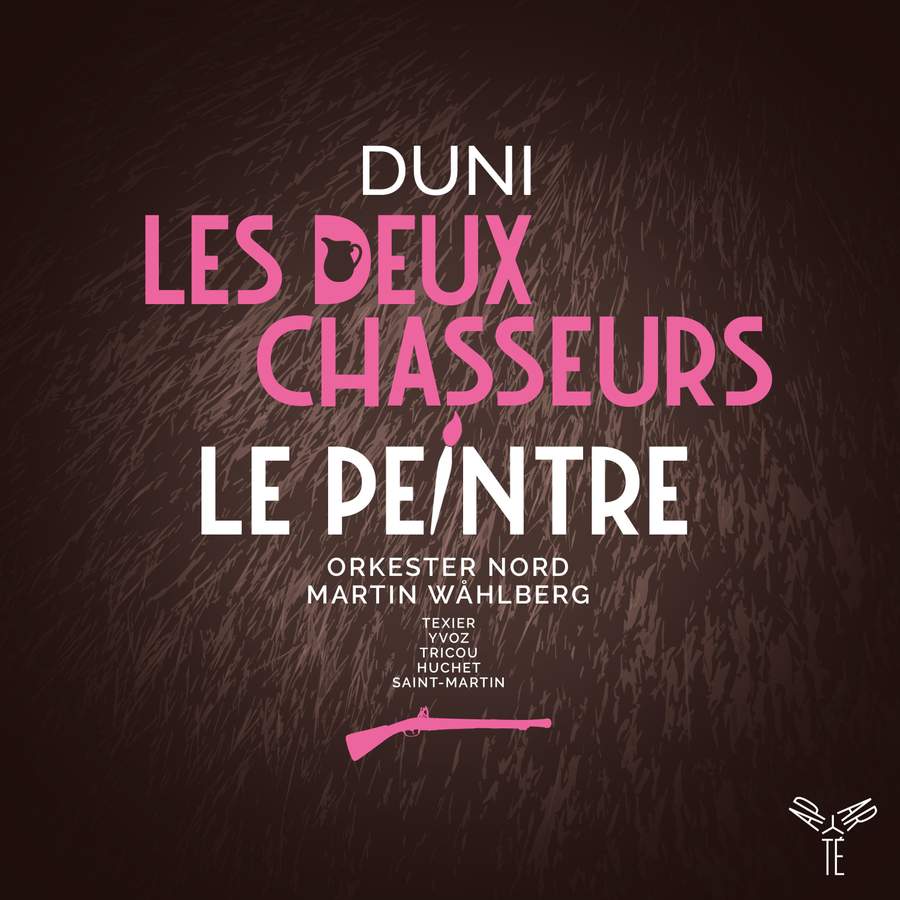DUNI Le peintre amoureux de son modèle. Les deux chasseurs et la laitière
View record and artist detailsRecord and Artist Details
Genre:
Vocal
Label: Aparte
Magazine Review Date: 12/2023
Media Format: CD or Download
Media Runtime: 109
Mastering:
DDD
Catalogue Number: AP314

Tracks:
| Composition | Artist Credit |
|---|---|
| Le peintre amoureux de son modèle |
Egidio (Romualdo) Duni, Composer
Anaïs Yvoz, Jacinte, Mezzo soprano David Tricou, Zerbin, Tenor Eric Huchet, Alberti, Tenor Jean-Gabriel Saint-Martin, Guillot, Baritone Martin Wåhlberg, Conductor Orkester Nord Pauline Texier, Laurette, Soprano |
| Les deux chasseurs et la laitière |
Egidio (Romualdo) Duni, Composer
David Tricou, Colas, Tenor Martin Wåhlberg, Conductor Orkester Nord Pauline Texier, Perrette, Soprano |
Author: Richard Bratby
Egidio Duni (1708‑75) is not a total stranger to the recorded catalogue but he hasn’t been a regular visitor to Gramophone. A brief introduction, then: he was born into a musical family in Naples and enjoyed success as an opera composer in Rome (where he briefly outshone Pergolesi) and London, from where (after a period of ill health, and according to some sources an attack by brigands) he returned to Italy and the French-speaking court of Parma. In 1757 Duni travelled to Paris, where the success of Le peintre amoureux de son modèle, a French comic opera (or as Duni termed it comédie mêlée d’ariettes – ‘a comedy interspersed with ariettas’) proved an unexpected hit and (in the eyes of many commentators, including Rousseau) founded the genre of opéra-comique.
That brings us to this recording: two delightful short operas from Duni’s late-flowering Paris period in sprightly period-instrument performances. The pearl of the set is Les deux chasseurs et la laitière (1767): a fable of two inept hunters, Colas and Guillot, both in pursuit of a bear whose hide they have already sold; and the spirited young milkmaid Perrette, who has ambitions of her own.
There’s a freshness and a fantasy to Duni’s setting that’s hard to resist – from the rustic Overture portraying the hunters (complete with horns, naturally) caught in a forest rainstorm to the characterful ariettes and ensembles that punctuate the dialogue. Pizzicato strings accompany Guillot’s attempts to strike a light for his pipe with a wet flint; Perrette lays out her plans in a brilliant list song and later cries (literally) over spilt milk to a melancholy sicilienne. It’s charming and guileless, and in the knockabout banter between Colas and Guillot you can discern the ancestry of Offenbach’s one-act farces a century later.
The pioneering Le peintre amoureux de son modèle is also included. It’s a rather slighter piece, and some reconstruction of musical numbers seems to have been necessary. Alberti, a middle-aged painter, is besotted with his (young, female) model Laurette, who much prefers his apprentice Zerbin. Entanglements ensue before Alberti is persuaded to marry his (more age-appropriate) housekeeper Jacinte instead. Again, the freshness of Duni’s inspiration offsets the foursquare nature of the material and Jacinte, in particular, emerges as a vivid and engaging character, sung with smiling warmth by Anaïs Yvoz.
In fact, both works have very appealing casts, singing with a brightness and a style – unaffected, clear, light on vibrato and ornamentation – that’s wholly suited to the idiom and the material. Pauline Texier sparkles as Perrette and is just as appealing (though slightly more demure) as Laurette, too. David Tricou and Jean-Gabriel Saint-Martin make a droll pair of hunters, and both pieces are smartly conducted by Martin Wåhlberg, with tight, bristling orchestral playing from Orkester Nord. Perhaps it’s a little too brisk at first, but the ear quickly acclimatises; and after all, this is theatre – speed, plus a certain astringency of the acoustic, is wholly appropriate.
The production team has a lot of fun with the spoken dialogue, too: it’s crystal-clear, and supplemented by additional, often humorous sound-effects – doors, footsteps, clinking kitchenware and a suitably terrifying bear. Add comprehensive booklet notes by Wåhlberg plus a full (and mostly accurate) libretto and translation, and it’s never been easier to dive straight into Duni’s musical-dramatic world. Why not? The water’s lovely.
Explore the world’s largest classical music catalogue on Apple Music Classical.
Included with an Apple Music subscription. Download now.

Gramophone Digital Club
- Digital Edition
- Digital Archive
- Reviews Database
- Full website access
From £8.75 / month
Subscribe
Gramophone Full Club
- Print Edition
- Digital Edition
- Digital Archive
- Reviews Database
- Full website access
From £11.00 / month
Subscribe
If you are a library, university or other organisation that would be interested in an institutional subscription to Gramophone please click here for further information.




